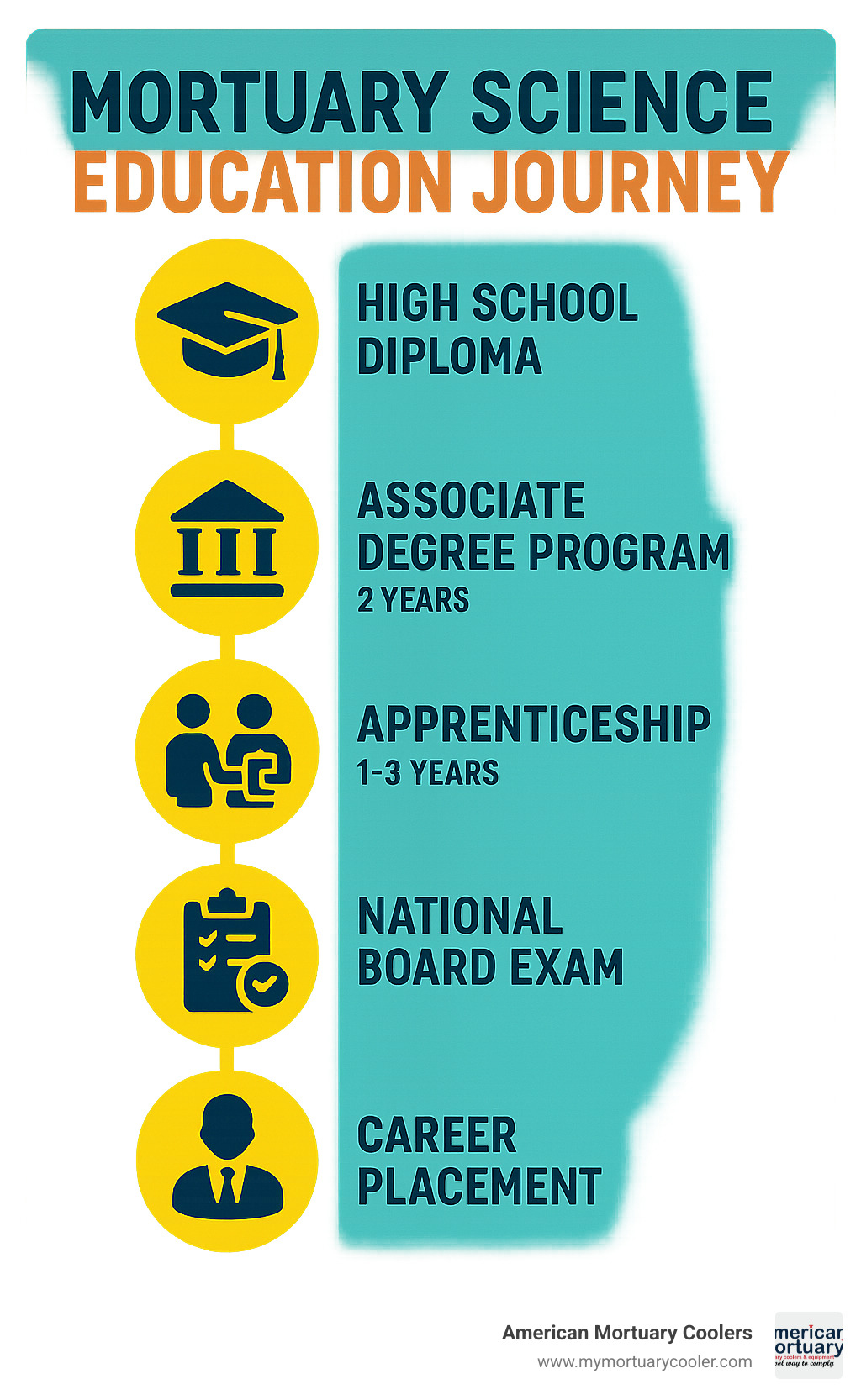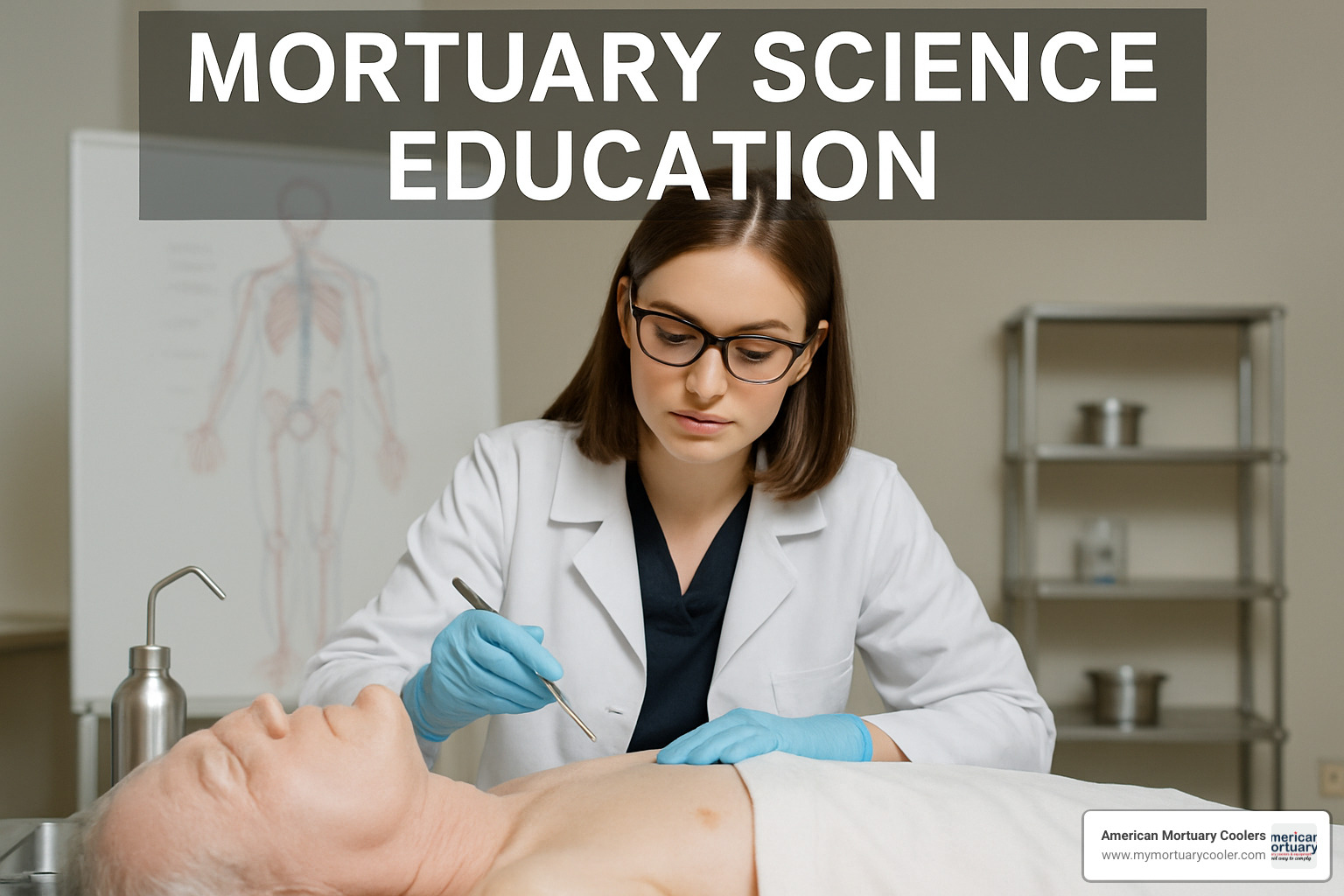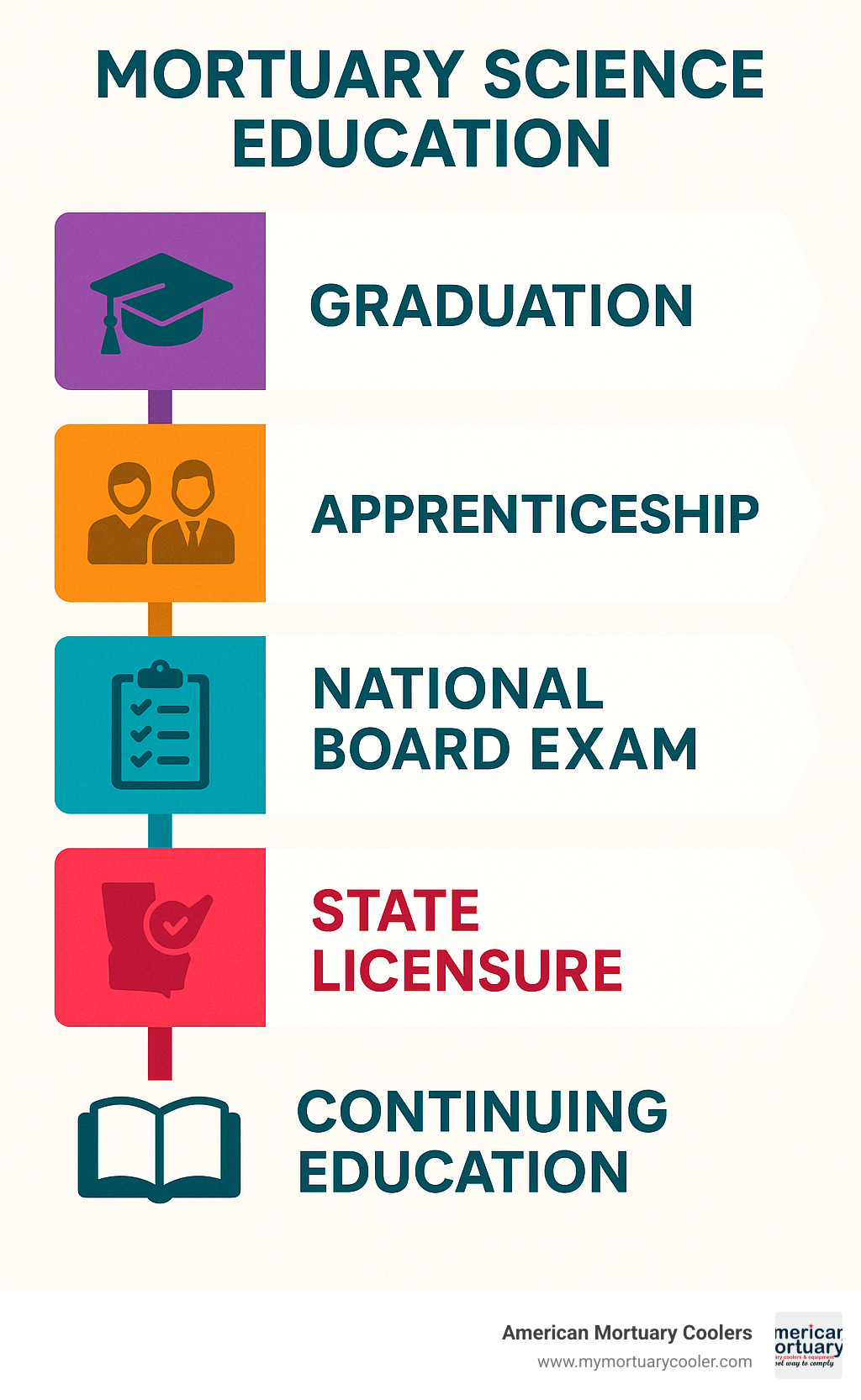
Mortuary Science Education 101: An Essential Guide to Getting Started
Why Mortuary Science Education Opens Doors to a Meaningful Career
Mortuary science education provides the essential training needed to become a funeral director, embalmer, or mortician - professionals who help families through their most difficult times. This specialized field combines scientific knowledge, business skills, and compassionate care to serve communities nationwide.
Quick Overview of Mortuary Science Education:
- Education Required: Associate degree (most common), bachelor's degree, or certificate program
- Program Length: 1-4 years depending on credential type
- Average Cost: $23,753 for undergraduate programs
- Apprenticeship: 1-3 years required after graduation
- Licensing: National Board Exam plus state-specific requirements
- Career Outlook: 4% growth projected through 2033
- Median Salary: $60,580 annually
- Key Skills: Embalming, grief counseling, business management, legal compliance
The funeral service profession has undergone significant changes in recent decades. Today, over 70% of candidates entering mortuary science programs are women, reflecting the profession's evolution toward emphasizing compassion and communication alongside technical expertise.
Most states require an Associate Degree in Funeral Service Education from an ABFSE-accredited program, which typically includes 60 semester hours covering anatomy, embalming techniques, grief counseling, funeral law, and business management.
As someone who has worked extensively with funeral professionals across the country, we understand the critical role that proper training and reliable equipment play in mortuary science education and daily operations.

Handy mortuary science education terms:
What You'll Learn in This Guide
This comprehensive guide covers everything prospective students need to know about entering the funeral service profession. We'll walk you through the educational pathways, admission requirements, costs, licensing process, and career outlook.
What Is Mortuary Science? Careers & Day-to-Day

Mortuary science is the professional field dedicated to caring for the deceased and supporting families through their grief journey. It combines scientific knowledge with deep compassion, where professionals serve as guides during life's most challenging moments.
A funeral director coordinates everything from meeting with families to handling paperwork and managing the business side. An embalmer specializes in the preservation and preparation of the deceased, using chemistry and anatomy knowledge. A mortician typically does both jobs, while undertaker is an older term that's less common today.
According to the Bureau of Labor Statistics, funeral service workers earn an average of $58,200 annually, with the median reaching $60,580. The field employs about 61,000 professionals nationwide and expects 4% job growth through 2033.
Core Roles in the Funeral Profession
Arranging services involves helping families choose everything from caskets to flowers while navigating complex emotions. Funeral directors coordinate with cemeteries, arrange transportation, and handle countless details.
Embalming procedures require both scientific precision and artistic skill. Embalmers must understand anatomy, chemistry, and pathology while treating each person with respect.
Cremation management has become increasingly important as more families choose this option. This involves ensuring proper identification procedures and operating specialized equipment safely.
Business operations keep funeral homes running smoothly, from accounting and marketing to staff management and regulatory compliance.
Emotional & Ethical Considerations
Cultural sensitivity is crucial in this work. Funeral customs vary dramatically among different religious and ethnic communities, and professionals must understand and respect these differences.
Self-care isn't optional in this profession - it's essential. Many mortuary science education programs now include training on managing the psychological demands of death care work.
Mortuary Science Education Pathways
When you're ready to start your journey into funeral service, you'll find several educational paths available. The American Board of Funeral Service Education (ABFSE) serves as your quality assurance - they ensure mortuary science programs meet industry standards. Always check for ABFSE accreditation when looking at schools.
Associate degree programs are the most popular choice. These two-year programs pack about 60 credit hours of comprehensive training covering everything from embalming science to helping families through grief. Most states require this level of education.
Bachelor's degree programs offer deeper academic preparation for those interested in funeral home management. These four-year programs include all funeral service essentials plus advanced business training and management courses.
Certificate and diploma programs offer a more focused approach, typically lasting 10 months to two years. These can be perfect for career changers or those with existing college experience.
| Program Type | Duration | Credit Hours | Typical Cost | Best For |
|---|---|---|---|---|
| Certificate | 10-18 months | 12-25 | $8,000-15,000 | Career changers, specific skills |
| Associate Degree | 2 years | 60 | $20,000-30,000 | Most common pathway |
| Bachelor's Degree | 4 years | 120+ | $40,000-80,000 | Management track, advanced study |
More info about degree options
Curriculum & Skills in mortuary science education
Science courses form the foundation of your technical knowledge. You'll study human anatomy and physiology, microbiology and pathology, and chemistry - especially as it relates to embalming fluids and preservation techniques.
Embalming laboratory training is where theory meets practice. Modern programs use state-of-the-art facilities where you'll learn preservation techniques, master restorative art, and develop proper handling procedures.
The business side of funeral service includes funeral home operations, accounting and financial management, and marketing. Most funeral homes are small businesses, and understanding business operations is crucial.
Social sciences and communication skills cover the psychology of grief, basic counseling techniques, and cultural and religious customs. This knowledge helps you serve diverse communities with sensitivity.
Legal and ethical studies ensure you understand funeral service law, business ethics, and regulatory compliance. The funeral industry is highly regulated.
More info about embalming science
On-Campus vs Online vs Hybrid mortuary science education

Traditional on-campus programs provide full access to laboratory facilities, direct faculty interaction, and immediate hands-on training. The structured environment helps many students stay focused.
Online components have become increasingly popular. Many programs now offer theoretical coursework online, which benefits working students or those in remote locations. However, hands-on components like embalming labs must still be completed in person.
Hybrid programs combine online theory with intensive on-campus laboratory sessions. You might complete coursework online throughout the semester, then attend intensive weekend sessions for hands-on training.
Clinical rotations are crucial regardless of delivery method. These supervised experiences in functioning funeral homes let you apply classroom knowledge in real-world settings.
Admissions, Costs & Financial Aid

Getting into a mortuary science education program requires more than just filling out an application. Most programs require your high school diploma or equivalent, minimum age of 18, and usually a minimum GPA of 2.0 to 2.5. You'll likely need prerequisite biology courses if you haven't already taken them.
Nearly every program requires observation hours at a working funeral home, typically 40 to 100 hours. You'll also need to write a letter of intent explaining why you want to enter funeral service.
The average cost for mortuary science education programs runs about $23,753 for undergraduate programs. Tuition typically ranges from $15,000 to $35,000 for associate degree programs, with additional costs for textbooks and materials ($980-$1,500 per year), laboratory fees ($500-$2,000 annually), and equipment and uniforms ($300-$800).
Financial aid options include the FAFSA for federal Pell Grants and loans, National Funeral Directors Association scholarships, and ABFSE scholarship opportunities. Many state funeral director associations offer local scholarships, and some funeral homes provide employer reimbursement programs.
External scholarship directory
How to Strengthen Your Application
Volunteer experience in healthcare, eldercare, or community service shows you're comfortable around people during difficult times. Job shadowing beyond minimum required hours demonstrates genuine commitment.
Strong recommendation letters from funeral professionals, science teachers, or employers who can speak to your character are essential. Your personal statement should share specific experiences that led you to funeral service rather than generic statements.
Budgeting for Mortuary Science Education
Certificate programs cost less upfront but may limit career options in some states. Associate degree programs offer the best balance of cost and career flexibility. Bachelor's programs cost more but can fast-track you into management roles.
Consider living expenses and part-time work options, though demanding laboratory schedules limit your availability. Once you start your apprenticeship, you'll earn wages while completing training, helping offset educational debt.
Apprenticeship, Licensing & Career Outlook

The journey from mortuary science education graduate to licensed professional involves a crucial apprenticeship period followed by rigorous licensing examinations.
Every state requires newly graduated students to complete an apprenticeship under licensed supervision. The apprenticeship period varies significantly - Georgia requires 3,120 hours over 18 months, while other states require one to three years. You'll work directly with experienced professionals, learning nuances that can't be taught in a classroom.
Most states require you to complete a minimum number of actual cases during apprenticeship, ranging from 10 to 75 cases. You'll maintain detailed logs documenting every aspect of your training.
Once you've completed your apprenticeship, the licensing process begins. The National Board Examination is required in most states and covers federal regulations and general funeral service knowledge. You'll also need to pass your state-specific law examination and possibly practical skills assessments.
Licensing fees vary dramatically by state - Alabama charges $570 while Florida requires $375 plus a $50 application fee.
The career outlook remains steady and promising. The Bureau of Labor Statistics shows the profession employs about 61,000 people with 4% growth projected through 2033. The median salary stands at $60,580 annually, with experienced professionals earning $39,000 to $76,000 or more.
Interestingly, over 70% of new candidates entering the field are women, reflecting the profession's evolution toward emphasizing compassion and communication skills.
Making the Most of Your Apprenticeship
Choose your supervising mentor carefully - look for someone who enjoys teaching and can expose you to diverse aspects of funeral service operations. Don't just observe - actively seek opportunities to practice embalming procedures, arrangement conferences, and business operations.
Maintain detailed professional log books beyond minimum requirements. Document what you learned, challenges you overcame, and skills you developed.
Continuing Education & Advancement
Most states require continuing education credits to maintain licensure. Many professionals specialize in areas like crematory operator certification, green burial practices, grief counseling certification, or preneed sales licensing.
For those with entrepreneurial ambitions, management and leadership tracks provide pathways to funeral home ownership or senior management positions.
Frequently Asked Questions about Starting a Career in Mortuary Science
What prerequisites do I need before applying?
Your high school diploma is the foundation, but mortuary science education programs look for more. Strong science coursework is essential - particularly biology and chemistry. Most programs require observation hours before you can apply, typically 40-100 hours in a funeral home.
Your application essay carries significant weight. Admissions committees want to understand your genuine motivation for entering funeral service. Letters of recommendation from funeral service professionals, science teachers, or community leaders help round out your application.
How long does mortuary science education take?
Certificate programs offer the fastest entry at 10-18 months. Associate degree programs take about 2 years and represent the most common pathway. Bachelor's degree programs extend to 4 years but provide the deepest preparation.
Graduation is just the beginning. You'll need to complete a 1-3 year apprenticeship under licensed supervision before practicing independently. The total journey typically spans 3-6 years.
What exams must I pass for licensure?
The National Board Examination is required by most states and covers federal regulations and general funeral service knowledge. Your state law examination focuses on local regulations and regional practices. Many states also require a practical skills assessment where you demonstrate hands-on competency.
Conclusion
Starting a career in mortuary science education is more than choosing a profession - it's answering a calling to serve families during their most vulnerable moments. The journey requires years of study, rigorous apprenticeships, and challenging licensing exams, but every day, you'll help families find peace during their darkest hours.
The numbers tell a promising story. With 4% job growth projected through 2033 and a median salary of $60,580, the profession offers both stability and financial security.
As a company that's worked with funeral homes across all 48 contiguous states, we've seen how quality mortuary science education translates into professional excellence. The funeral directors and embalmers we serve consistently demonstrate the high standards their training instilled.
Durable, reliable equipment matters just as much as solid education. When families trust you with their loved ones, everything must work perfectly. That's why we design our custom mortuary coolers to meet the exacting standards that mortuary science education programs teach.
Whether you're a high school student exploring career options or considering a career change, remember: the funeral service profession needs compassionate, skilled professionals like you. Every family you'll serve will remember your kindness during their time of loss.



